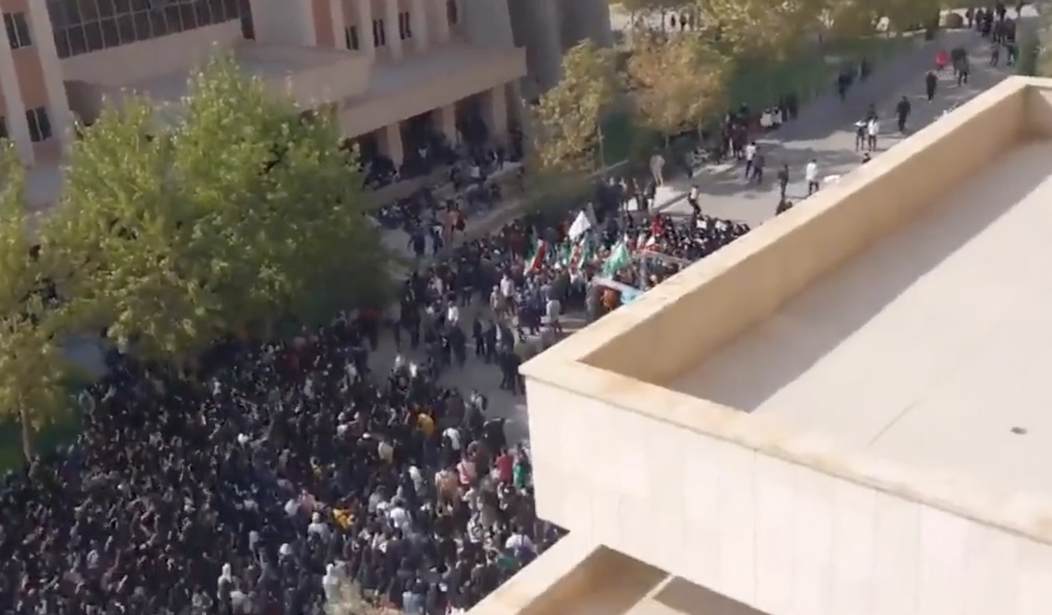The Commander of Iran’s elite Revolutionary Guards Corps, Hossein Salami, warned protesters on Saturday, “Today is the last day of the riots. Do not come to the streets again.”
Meanwhile, Reuters reports that, despite the warning, confrontations between police and protesters continued throughout the country as even the youngest girls are now defying the hijab law.
Little girls in Iran flapping their headscarves in the air. pic.twitter.com/kOR60iHhyQ
— Frida Ghitis (@FridaGhitis) October 20, 2022
Here are some rooftop snipers awaiting further orders. More than 400 protesters have died since the unrest began 6 weeks ago — many of them shot by snipers like these.
With the commander-in-chief of #Iran's IRGC proclaiming "today is the last day of protests" and potentially signaling a harder crackdown to come, photo circulating via @1500tasvir of snipers at the top of a building of Gohardasht. #MahsaAmini pic.twitter.com/9ewjpqGMQh
— Jason Brodsky (@JasonMBrodsky) October 29, 2022
“We are the roar of a thousand silences,” said an Iranian entertainer. He was later arrested, and his whereabouts are unknown.
دانشگاه تهران شمال
Student protests Tehran University North Iran today.#Iran #MahsaAmini #OpIran #مهسا_امینی #ایران pic.twitter.com/qGTvFJYb4e— Ali Hadji Jafari (@Ali_HJafari) October 30, 2022
Solidarity protest in Berlin. Looks like Western feminists finally got off their butts and are now fully engaged.
Wow! Berlin…This is just breathtaking. Solidarity, unity, and freedom for Iran. #MahsaAmini #مهسا_امینی #IranProtests pic.twitter.com/k4qddPkA4M
— Omid Memarian (@Omid_M) October 22, 2022
Two weeks ago, protesters were limited to small, furtive gatherings where they’d use flash mob tactics to arrive at the protest site, chant for a few minutes, and then disperse before the police could arrive in force.
These are the protests today.
Last night security forces attacked more than 20 universities across Iran. They kidnapped students to prevent them from protesting. Here is the result; this morning, incredible turnout in the university of Zanjan.
This is the beginning of the and, we won’t give up” #MahsaAmini pic.twitter.com/0REvcfUDOK— Masih Alinejad 🏳️ (@AlinejadMasih) October 30, 2022
A rare joint statement from the IRGC Intelligence Unit and Intelligence Ministry was published on Iran’s semi-official Tasnim news agency. The IRGC is a branch of the Iranian Armed Forces, founded after the Iranian Revolution in 1979 by the order of Ayatollah Ruhollah Khomeini.
The statement said the CIA, under the cover of the US State Department, visited the headquarters of the “separatist group called Kurdistan Democratic Party of Iran” in the city of Erbil, Kurdistan region of Iraq, and met and talked with the leader of that group named Mustafa Hijri.”
It also added that “the American spy organization” wanted to play a greater role in the disturbances that occurred in some cities of Iranian Kurdistan.
It’s not just the Kurdish minority who have used the hijab protests to demonstrate for their autonomy. Separatists in Baluchistan have also engaged regime forces, resulting in several dozen protesters getting shot. Iran’s oppressed minorities — including nearly two million Arabs — are driving the protests as well.
The proximate cause of the protests — the death of Mahsa (“Jina”) Amini in the custody of the morality police — occurred in the Kurdish city of Saqqez, and that’s where the first protests broke out. Indeed, as MEMRI points out, ethnic minorities in Iran are not being heard in the West as a result of a deliberate effort by Persian media.
Inside and outside Iran, Persians have failed to amplify or even listen to the voices of minorities that form the backbone of the current revolution. The international media’s coverage of the Iranian protests and perspectives as being the sole representatives of Iran, has further marginalized the ethnic and religious minorities and bolstered the Persian-centrism of the Iranian regime. “When was the last time an Iranian Lur or Ahwazi was given a global platform to voice their opinions on Iran’s regime or Western foreign policy towards Iran? How can non-recognized religious minorities such as Bahai’s or Sikh speak globally from within a state that affords them no protections?” scholars Asha Sawahney and Sabrina Azad wrote.
Needless to say, judging from the massive turnout today in the streets of Iranian cities, the Revolutionary Guard commander did the protesters a favor. It appears that the demonstrations will continue until the jails — and the morgues — are full.










Join the conversation as a VIP Member